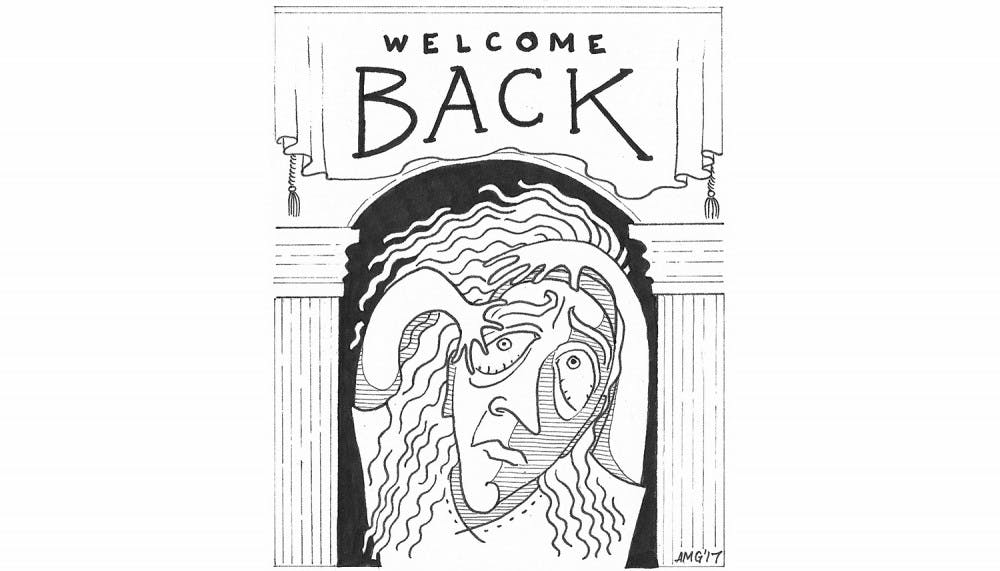When I first called CAPS last May, I didn’t know that I had an eating disorder, much less understand the extent to which recovering from it would shape the next year of my life.
Things came to a head in the middle of a Tuesday night last December. I sat slouched against the concrete walls of Harnwell’s East stairwell on the phone with my mom, paralyzed by indecision. I couldn’t get healthier at Penn, and I couldn’t continue at Penn until I was healthier.
It only took one sentence to confirm what I already knew: “I think you should come home.”
I bet that, like me, many of you have a plan. It might be painstakingly laid out on a spreadsheet, or it might simply be an idea of where you want to be in a year or five. It involves being “successful,” meaning that you’re great at your job, loved by all, and doing everything effortlessly. When I decided to take a leave of absence, I was afraid to disrupt my plan and to lose the sense of control it gave me. I was even more scared to admit – to my peers, my family, and myself – that I was struggling.
My struggles at Penn were defined equally by my experiences before I arrived on campus and what I experienced once I was here. The mindsets that had fed my eating disorder— perfectionism, ambition, need for control – ran much deeper. Before college, I gained control by planning for the future. I convinced myself that by following a defined path to a defined point, I’d finally find happiness.
Throughout high school, the defined point was Penn. I believed it was the place where my life would really begin. I had been excited to be in an environment of driven and passionate people; “pre-professional” didn’t scare me off, because that was how I saw myself. And then all of a sudden I was here, living this future I’d so meticulously planned. I didn’t feel happy at all – I felt betrayed. I thought Penn had let me down.
While I had expected to be around driven people, I found a competitive culture that extended far beyond the classroom. I found a culture that prioritized getting a “good job” over following a passion, or at least couldn’t distinguish between the two. I tried my best to compete, changing who I was in an attempt to belong. As I became someone I wasn’t, I was left with a crippling social anxiety: if I didn’t like me, how could anyone else?
I now realize that in many ways, Penn is exactly what I expected it to be. But I'm not who I expected me to be. Over the course of my freshman year, I started to get a feeling that I was headed for a future that I’d once written about in a college essay but no longer particularly wanted. I felt stuck on a treadmill going a little too fast. Everyone around me seemed to know what they were doing, and I needed to keep up.
Questioning my future plans for the first time, I felt out of control. So I coped in the only way I knew: by making myself smaller. My eating disorder really started in earnest the day that I bought a scale. Before I knew it, weight had replaced grades as the most important number in my life. Caught up in the obsession, I initially couldn’t understand what was happening. I didn’t see that weighing myself several times a day wasn’t normal.
After several months, I sought help. Therapy was useful, but addressing my eating disorder made it hard to go about my life as a student, and the physical nature of the mental illness made it harder still. One day near Thanksgiving, my therapist suggested that I needed treatment – treatment that I couldn’t get while still a student. Initially, I continued to maintain that I would be okay. I was reluctant to let go of the image of perfection that I had cultivated my whole life. I thought I didn’t really need time off. I could make it through the next five semesters.
The suggestion that I needed more help intensified what I was already experiencing, and taking time off went from a possibility to a necessity. A week later, after that night in the Harnwell stairs, I applied to take a leave of absence.
On leave, I’ve made great strides toward recovering my physical and mental health, but I’ve also come out with a more fluid understanding of my future. For the first time, I’m okay not knowing what I’m doing when I graduate or what I’m having for dinner, and coming back to Penn with that mentality will serve me well.
I know that it’ll be difficult to balance the demands of being a student with the continuing demands of recovery. But I also know that I’m returning with a healthier body, a strong support system, and a better understanding of myself. In many ways, Penn will never be the perfect place for me, but I’m committed to finding ways to make it work — to engage with people and experiences because they fulfill me, not because they’ll look good on a resume or in an Instagram post.
Your version of taking time probably won’t look the same. It might be taking a semester to work or to chill at home. It might be taking a weekend away from campus with friends. It might be taking those few empty hours between classes to go for a walk in Clark Park.
Whatever it is, I hope you find it. We can take our time.







